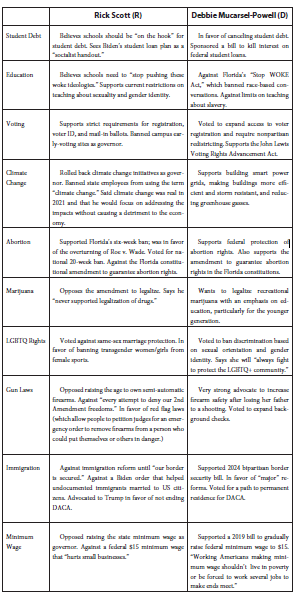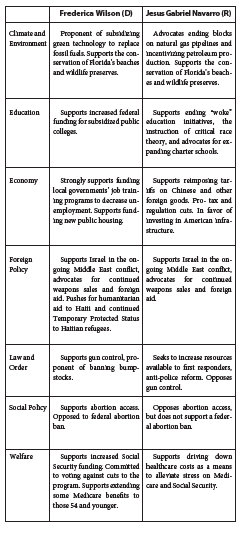With the elections quickly approaching on November 5, it’s easy for the presidential race to monopolize the discourse. This voter info guide, created by the Politics and CurREnt Events Club, aims to focus on key state/local elections that may receive less media attention, but are just as impactful for the average Floridian.
Ballot Amendments
This year’s ballot includes six proposed amendments to the Florida State Constitution, all of which require a 60% yes vote to pass. Find a summary of each amendment below.
1: Makes school board elections partisan beginning in the November 2026 general election/primary elections nominating party candidates for 2026
This amendment would require school board candidates to be first nominated in partisan primaries, resulting in a general election in which candidates are labeled by their party affiliation (i.e. Democrat, Republican). Proponents suggest that the change would make elections more transparent to voters, while detractors argue that it would politicize a nonpolitical position.
2: Establishes hunting and fishing as a state constitutional right
This amendment would enshrine the right to hunt and fish in Florida, preventing legislation that would prohibit such activities. (Note that this would not impede the authority of state agencies to regulate said practices.) Supporters argue that pushes to criminalize hunting in other states has put fishing and hunting in Florida at risk, while detractors argue that the amendment would hinder environmental protections.
3: Legalizes the personal or recreational use of marijuana
This amendment would legalize the possession of recreational marijuana in quantities of 3 ounces or less for adults over the age of 21. Licensed medical marijuana facilities would be authorized to sell marijuana for recreational purposes, with the possibility for dedicated recreational dispensaries at the discretion of the legislature. Supporters argue that the amendment would bolster the economy and ensure regulation of the drug so as to prevent lacings that might occur in a black market. Detractors suggest that marijuana would become more prevalent, potentially serving as a gateway drug.
4: Makes abortions before fetal viability a state constitutional right
This amendment would provide a constitutional right to abortion a) before viability (usually around 24 weeks depending on the medical situation), or b) when “necessary to protect the patient’s health, as determined by the patient’s healthcare provider.” The amendment says that no law can block, delay, or restrict abortions before viability or when needed to protect a patient’s health according to their healthcare provider. Note that regardless of the decision, the amendment wouldn’t change laws about parental notification, meaning a minor who wants an abortion would still need to notify their parent. Supporters argue that the amendment protects a woman’s right to choose and ensures access to necessary healthcare without government interference. Detractors believe it
goes too far in allowing abortions and undermines the rights of the unborn, with potential moral and ethical concerns.
5: Provides annual inflation adjustment for the value of homestead property tax exemption
This amendment would require an annual inflation adjustment to the amount of assessed value that is exempt from property taxation. Right now, homeowners in Florida can get the value of their home reduced before taxes are calculated, which helps lower the amount of tax they have to pay (this is the homestead exemption). Amendment 5 would make it so the homestead exemption can grow each year based on inflation, allowing homeowners to pay less taxes. Proponents say the amendment would provide necessary tax relief, helping homeowners keep up with rising costs. Detractors argue it could reduce local government revenue, potentially leading to cuts in essential services or higher taxes elsewhere. Note that this change would only apply to non-school taxes.
6: Repeals constitutional provision providing for public campaign financing (if candidates agree to spending limits)
Amendment 6 would work to get rid of public campaign financing in Florida. Right now, candidates running for statewide offices (i.e. governor or cabinet members) can get public money to help fund their campaign, as long as they agree to limiting how much they spend and raising a certain amount of money on their own. The public funding comes from taxpayer money, with the goal being to help ‘level the playing field.’ If the amendment passes, it would stop public funding for campaigns, meaning candidates would have to rely more on private donations to run for office. Supporters argue that eliminating public campaign financing saves taxpayer money and prevents government funds from supporting political campaigns. Detractors believe public financing helps create fairer elections by giving less wealthy candidates a better chance to compete.
As Floridians prepare to vote on these amendments, the outcomes could have lasting implications on both local governance and statewide policy. Amy Exum, President of the Barnacle Society, the citizen support organization which supports the Barnacle Historic State Park in Coconut Grove, offered the following thoughts: “What is needed in today’s dynamic political environment is good judgment, personal and social responsibility, and community-government collaboration. Some may argue that these qualities are hard to find in today’s world, but they are necessary for democracy to be successful. It will be critical that, together with lawmakers, our society is able to quickly adapt to any negative
outcomes of the amendments failing or passing.”
U.S. Senate
Current incumbent Rick Scott (R) is running for reelection after 5 years as senator. Prior, he held the office of governor from 2011-2019. He is challenged by Debbie Mucarsel- Powell (D), former congresswoman for Florida’s 26th District from 2019 to 2021.

District 27 U.S. House of Representatives Election
Lucia Baez-Geller does not provide a specific list of issues or stances as part of her campaign. Instead, we’ve provided general descriptions of both candidates below.
Maria Elvira Salazar (R)
Maria Elvira Salazar is a US Congresswoman representing Florida’s 27th District. She is a vocal advocate for robust foreign policy, particularly in opposing authoritarian regimes in Latin America, such as Cuba and Venezuela. She also supports immigration reform that balances border security with opportunities for legal immigration. She favors pro-business policies, tax cuts, and a limited government role in healthcare.
Lucia Baez-Geller (D)
Lucia Baez-Geller is a progressive member of the Miami-Dade County School Board, known for advocating for inclusive education policies and supporting the rights of marginalized communities. She has been vocal in her opposition to book bans and efforts to restrict discussions on race, gender, and LGBTQ+ issues in schools.
District 24 U.S. House of Representatives Election
Incumbent Frederica Wilson (D), congresswoman for District 24 since 2013, is facing challenger Jesus Gabriel Navarro (R).

Miami-Dade County Sheriff
Miami-Dade County has not had a sheriff since 1966, when voters passed a referendum abolishing the office after its last occupant, Talmadge “T.A.” Buchanan, was accused of corruption. In 2018, however, another referendum passed that prevents the abolition of certain offices, including sheriff. For the first time in decades, voters will choose a top law enforcement officer for the County. The August 20 primary elections resulted in significant victories and endorsements that could reshape Miami-Dade’s law enforcement landscape.
Democrat James Reyes, a former corrections officer and the County’s current Chief of Public Safety, secured the endorsement of Mayor Daniella Levine Cava and triumphed over four opponents in the primary. He emphasizes a commitment to addressing corruption within the department. “Ultimately, the office of the sheriff should respond to the needs of the people, and the people want us to address corruption,” Reyes stated. He plans to establish a new anti-corruption unit aimed at restoring public trust. His platform, according to the Miami Times, emphasizes “ending recidivism” by “working to replace the school to prison pipeline with a school to public service pipeline.” His opponent, Rosanna ‘Rosie’ Cordero-Stutz, is backed by Donald Trump and prominent GOP figures including Mario Diaz-Balart and Carlos Gimenez, and won her primary against ten challengers. With nearly three decades of service to the Miami-Dade Police Department, Cordero-Stutz also highlighted corruption as a key issue, saying “the days of public officials acting with impunity are over” and pledging to
tackle it head-on with a robust anti-corruption task force. Her platform, according to the Miami Times, emphasizes “reorganizing resources and increasing patrols” in areas with “insufficient police presence.”





